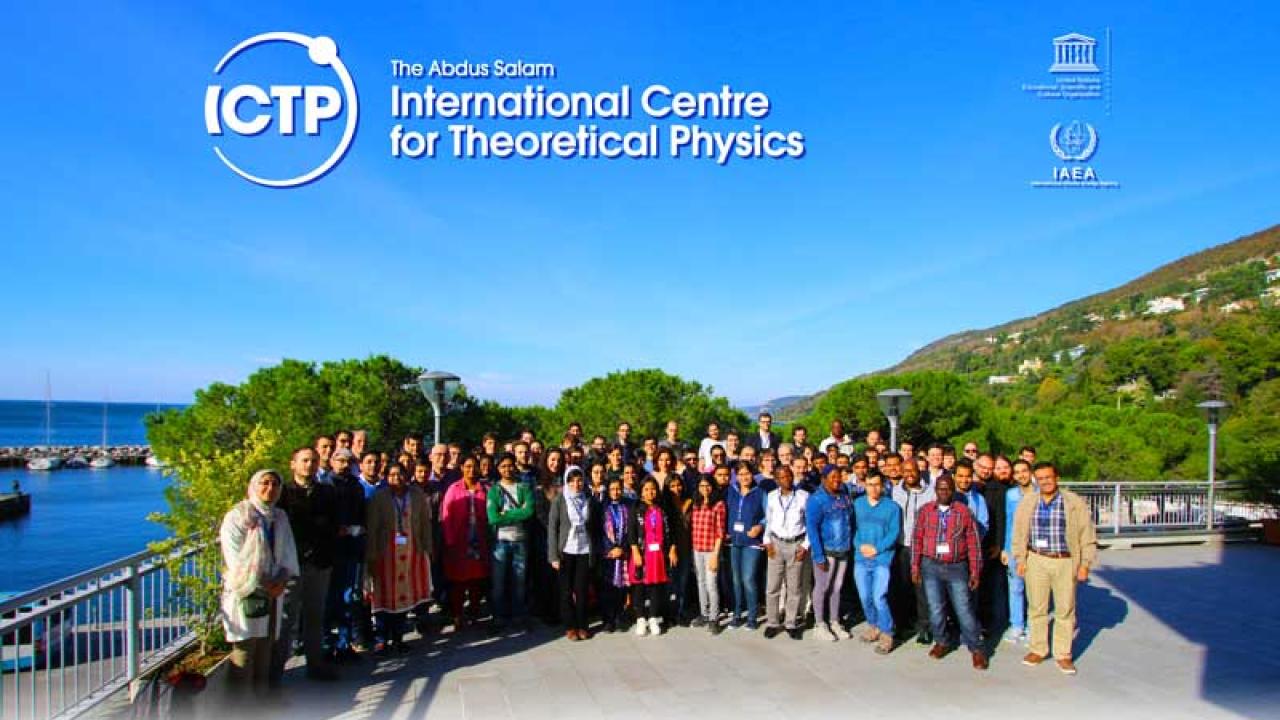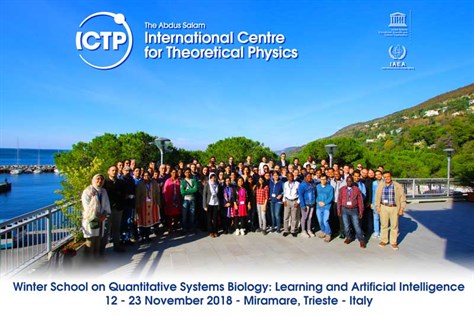
ICTP hosts many scientists every year, at different stages of their careers and from all over the globe, and they all have a different story. Midway through the Winter School on Quantitative Systems Biology: Learning and Artificial Intelligence, four participants sat down to talk about their work and why they were at the school, as well as what they want to do with their new knowledge. More than ninety participants from many research fields and more than thirty countries came to the school. "People from a broad spectrum of backgrounds are at this school," said Antonio Celani, ICTP scientist and co-organizer of the school. "Artifical intelligence is an exploding field and a lot of different types of scientists are interested in how it can help their research."
The four are:
- Kurama Onesfole, Department of Mathematics, Makerere University - Uganda;
- Oluwabukonla Folorunso Sakinat, Olabisi Onabanjo University in Ago-Iwoye, Nigeria;
- Antonio Serrano Munoz, the University of Havana in Havana, Cuba;
- Naushin Nower, the Institute of Information Technology (IIT) at the University of Dhaka in Dhaka, Bangladesh
What is your background and research focus?
Onesfole: I do interdisciplinary mathematics, focusing on computational sciences, applied mathematics, and data analysis.
Sakinat: I'm in computer science, I did my masters and PhD in machine learning. I'm focusing on computer vision techniques, and how machine learning algorithms behave in the face of adversity.
Serrano Munoz: I am a university professor in physics with a background in engineering, focusing on automatics, as well as a master's in computer science.
Nower: I am working as an assistant professor at the University of Dhaka and my research interest is in IoT (Internet of Things), specifically how IoT devices communicate with each other and with stored data in the cloud. To process and make use of the huge amount of data that results, machine learning is needed, so I’m at this workshop to learn about different techniques of machine learning.
Why were you interested in attending this meeting?
Onesfole: Networking is hugely important at meetings like this; doing research in Africa is different from doing research in Europe. We're dealing with a lot of other issues, like political instability, almost no money for research, positions getting very politicized, difficulty traveling and getting visas. We have very talented students, and now we have to figure out how to help them do something good for the world.
Serrano Munoz: I taught a semester course on AI based on my master's in computer science, where my favourite subject was artificial intelligence, and now I want improve my ability to teach AI. I love teaching, it's the job of my life.
Sakinat: I would like to come to more workshops to further expand my knowledge. A lot of it is new for me, but it's something I've been longing for.
Nower: Deep learning is a real buzzword and emerging current topic in the field of machine learning. I would like to apply the emerging techniques of machine learning to IoT for better data processing, helping to predict accurate outcomes. IoT has already been used in many areas: smart agriculture, smart grids, traffic management, inventory management, disaster warning systems and many more. My goal is to expand my knowledge in the field of machine learning so that I can apply machine learning in my own research field. 
How has the workshop been going?
Sakinat: This first week of the workshop has been very engaging, though sometimes the math can be a bit overwhelming. But it has helped me get an idea of what to investigate when my models suddenly behave unexpectedly. I have several things I want to look into when I get home.
Serrano Munoz: This is a very theoretical conference, I prefer more the hands-on parts. The theory is very important for teaching, to get the background, but after that... I'm an engineer. The theoretical and the practical, they cannot be separated.
Nower: My background is computer science but this course is a little bit intense. I prefer to learn things from the hands-on tutorials, they are more exciting and give practical guidelines. It is easier for me to understand the concepts from the hands-on sessions, and then have ways to teach these basic concepts to my students. Although to me the best parts were the hands-on sessions, most of the lessons were theoretical, but we need both the theoretical concepts and practical training. It's very nice to understand both the theory and the practice of these concepts.
Onesfole: The research group at my current university mostly does work on more traditional fields, not so much those linked to applications that have real world, real time applications. I want to use those real world applications to demonstrate to students how they link to math. AI and machine learning can have quite a few real world applications, helping me figure out how to present related math to students better.
What are you planning on doing with the knowledge you gain here?
Onesfole: There is another group at my university that does a lot of disease modeling and biomathematics. I'm not comfortable with too much biology, but I've found that I can help them by talking about math happening in the neural networks they are using, helping interpret what's happening in models used. That's where knowing more about deep learning can help me.
Sakinat: I'm interested in advancing my career to deal with problems with health. There's a bioinformatics group at my university, how AI and biology mix would be a good starting point for me.
Serrano Munoz: I am one of three engineers in my research group and I have the hard job of designing prototypes for various investigations. For instance, we work with Antonio Celani from ICTP in his research on ants, so I built a robot for tracking the ants. We are hoping to use AI in our research, to solve many problems.
Nower: My plan is to use this knowledge in my research, to apply deep learning to IoT to expand its predictive powers. If I know many different types of machine learning, I can use the one that is most appropriate for my research.













